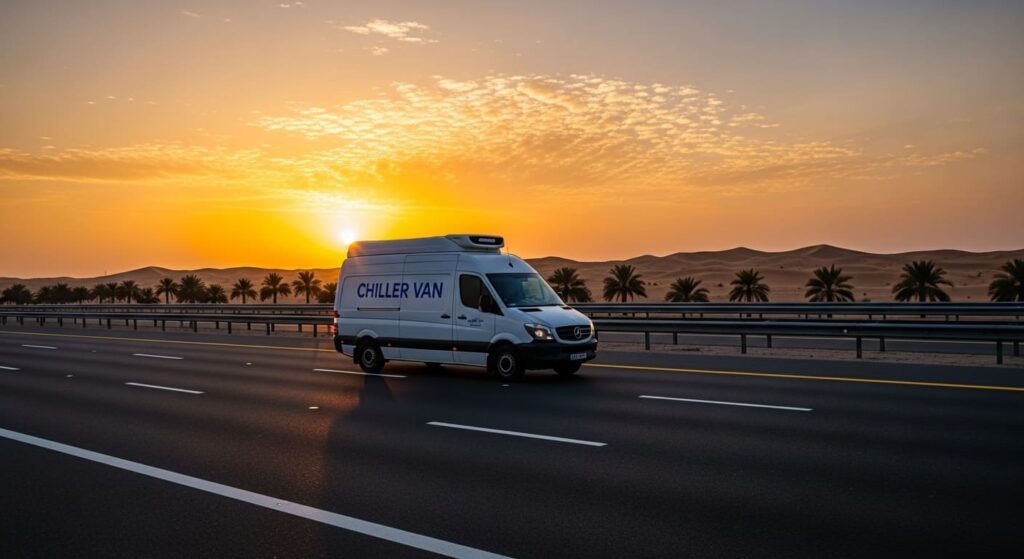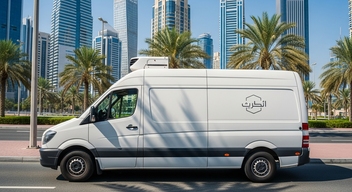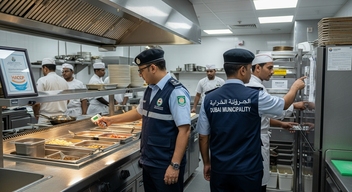
In the UAE, where summer temperatures often exceed 45°C, transporting temperature-sensitive goods is a constant challenge. Fresh food, pharmaceuticals, flowers, and cosmetics can easily spoil or lose quality during transit without proper cooling systems.
That’s why businesses across Dubai, Abu Dhabi, and Sharjah depend on chiller van hire to maintain freshness and compliance during deliveries.
A reliable chiller van hire guide helps you understand how to select the right vehicle, meet safety standards, and manage costs effectively.
Whether you run a catering company, supermarket, or healthcare facility, having the right cold transport strategy ensures your goods stay protected — from warehouse to destination.
Table of Contents
Understanding Chiller Van and How They Work
Temperature-controlled transport is the backbone of cold-chain logistics in the UAE. To make smart rental choices, it’s essential to understand how chiller vans function and what makes them suitable for different goods.
What is a Chiller Van?

A chiller van is a temperature-controlled vehicle designed to keep cargo within specific cooling ranges during transport. It’s equipped with advanced refrigeration units that circulate chilled air to prevent spoilage, even in scorching UAE weather.
Unlike freezer vans, which maintain sub-zero temperatures for frozen goods, chiller vans are ideal for items needing moderate cooling between +2°C and +10°C.
Insulated vans, on the other hand, only slow temperature change without active cooling. Understanding these distinctions helps businesses choose the most suitable van type for their cargo.
Key Components of a Chiller Van
Every chiller van relies on several key components that ensure consistent performance. The refrigeration system includes compressors, condensers, and evaporators that circulate cooled air through insulated panels.
High-density insulation minimizes heat transfer from the outside environment, keeping temperatures stable even during long UAE routes.
Modern chiller vans also feature digital temperature sensors that monitor cargo conditions in real time. Efficient air circulation systems distribute cold air evenly, ensuring every product; from dairy items to pharmaceuticals; remains within safe temperature limits.
Temperature Ranges and Cargo Types
Different products require different temperature ranges, and choosing the right van depends on your cargo.
- Standard chiller vans (5°C to 10°C): Ideal for fresh produce, dairy, and bakery items.
- Freezer vans (0°C and below): Suitable for frozen goods like meat and ice cream.
- Multi-temperature vans: Offer dual compartments for transporting mixed goods.
For delicate items such as flowers, cosmetics, or medical supplies, maintaining consistent cooling is vital. Even slight fluctuations can affect quality or shelf life, especially in the UAE’s harsh climate.
Step-by-Step Chiller Van Hire Guide
Before hiring a chiller van, planning your logistics requirements is crucial. The right preparation ensures safety, cost-efficiency, and compliance with UAE transport standards.
Step 1 – Identify Your Cargo and Temperature Needs
The first step is understanding your cargo’s characteristics. Are you moving frozen meat or chilled beverages? Different products demand specific temperature ranges and humidity control. Consider how long your deliveries will take, how often doors will open, and what distance your vehicles will travel.
The more precisely you define your requirements, the easier it becomes to find a van that ensures consistent temperature performance throughout the journey.
Step 2 – Choose the Right Van Type
Selecting the correct van type is essential for maintaining product integrity. Standard chiller vans are best for daily deliveries of fresh foods, while freezer vans are used for long-distance or frozen transport. Businesses handling varied goods can benefit from multi-temperature vans, which maintain different cooling zones simultaneously.
Each van type differs in capacity, insulation level, and power source, so choose one that aligns with your product’s temperature sensitivity and delivery volume.
Step 3 – Check Vehicle Condition and Maintenance
A poorly maintained van can compromise your cargo. Always inspect refrigeration units, insulation quality, and interior hygiene before hiring. Look for signs of wear, odours, or leaks — all of which can indicate neglected maintenance.
Well-kept vehicles reduce the risk of temperature fluctuations, helping you avoid spoilage or HACCP compliance violations. Ask the provider about their maintenance schedule and ensure vehicles undergo regular servicing.
Step 4 – Verify HACCP and Compliance Standards
In the UAE, all temperature-controlled vehicles must adhere to HACCP (Hazard Analysis and Critical Control Points) standards. This system ensures food safety during storage and transport.
Reputable rental providers should have UAE municipality-approved documentation confirming compliance. Always verify certification before hiring, as this guarantees that your cargo remains within legal safety standards throughout transit.
Step 5 – Review Rental Duration and Pricing Options
Chiller van hire costs vary depending on duration, vehicle type, and cooling technology. Providers usually offer flexible contracts — daily, weekly, or monthly — based on your business needs.
While short-term hires suit event-based logistics, long-term rentals often provide better cost efficiency. Compare pricing structures and ask if fuel surcharges or maintenance fees are included to avoid hidden costs.
Step 6 – Ask About Tracking and Support
Modern logistics depends on visibility and reliability. A quality chiller van rental should include GPS tracking and remote temperature monitoring to give you full control over deliveries.
24/7 customer support is another crucial factor, ensuring that assistance is available if your van experiences a breakdown or temperature issue mid-delivery. This minimizes disruption and protects your cargo from spoilage.
Step 7 – Confirm Insurance and Delivery Coverage
Before signing a rental agreement, confirm that your provider offers comprehensive insurance coverage for both cargo and vehicle. Check the driver’s qualifications and ensure service zones cover all your delivery destinations across the UAE.
Proper coverage safeguards your business from unforeseen losses due to accidents or technical failures — providing continuity even in challenging conditions.
Quick Checklist Before Hiring
Use this simple checklist to make sure everything’s in place before committing to a chiller van hire:
- Verified temperature control system
- Current HACCP and compliance certificates
- Clear insurance coverage
- Flexible rental terms and transparent pricing
Cost Factors and Practical Tips for UAE Businesses
Hiring a chiller van in the UAE involves balancing cost, quality, and reliability. Here’s what you should know before finalizing your rental plan.
Understanding Chiller Van Hire Costs
Typical rental pricing models in the UAE include rates per kilometer, per day, or per tonnage. Costs may vary depending on the van’s capacity, refrigeration power, and fuel efficiency.
Be aware of additional expenses such as after-hours delivery charges, driver costs, or fuel top-ups. Understanding these variables upfront helps you plan budgets more accurately and avoid unexpected fees.
How to Optimize Rental Costs
There are practical ways to reduce your cold transport expenses without compromising quality.
- Plan routes strategically to reduce mileage and fuel usage.
- Combine multiple deliveries in one trip to maximize vehicle capacity.
- Consider long-term hire agreements if you have ongoing logistics needs — they often include maintenance benefits.
Efficient scheduling and coordination with your rental provider can significantly lower operational costs while ensuring consistent cold-chain performance.
Common Mistakes to Avoid When Hiring
Many UAE businesses overlook crucial details when hiring chiller vans. Avoid these common pitfalls:
- Choosing the wrong temperature range for your cargo
- Ignoring vehicle hygiene and maintenance records
- Failing to verify insurance and HACCP compliance
Paying attention to these factors prevents costly product losses and maintains customer trust in your delivery quality.
UAE Regulations and Safety Standards

Compliance with UAE transport standards is not optional — it’s essential for maintaining brand integrity and legal operation.
HACCP and Food Transport Standard
The HACCP system identifies potential food safety risks and defines control measures to prevent contamination during transport. For logistics operators, this means temperature logs, sanitation checks, and routine vehicle inspections must be part of daily operations.
Adhering to these standards ensures every delivery meets UAE food safety regulations and supports public health protection.
Municipality Guidelines for Refrigerated Vehicles
The Dubai Municipality and Abu Dhabi Food Control Authority enforce strict vehicle standards for refrigerated transport. Regulations include:
- Valid HACCP certification
- Proper vehicle labeling
- Routine sanitation and temperature validation
Non-compliance can result in fines or suspended operations, making adherence vital for businesses dealing with perishable goods.
Maintaining Consistency During Transit
Maintaining stable temperatures during UAE road journeys can be difficult, especially during long transits. To prevent deviations:
- Use smart monitoring systems that track live temperature data
- Limit door openings during stops
- Schedule deliveries during cooler hours when possible
Consistent monitoring ensures your goods remain within safe limits, even under challenging weather conditions.
Conclusion
Choosing the right chiller van hire solution is essential for maintaining product quality, safety, and compliance across UAE operations. A reliable, well-maintained, and HACCP-certified vehicle helps protect your goods, optimize costs, and ensure seamless deliveries.
For dependable, compliant, and temperature-accurate refrigerated transport, Freezchill.com offers UAE businesses peace of mind and reliability in every delivery.

